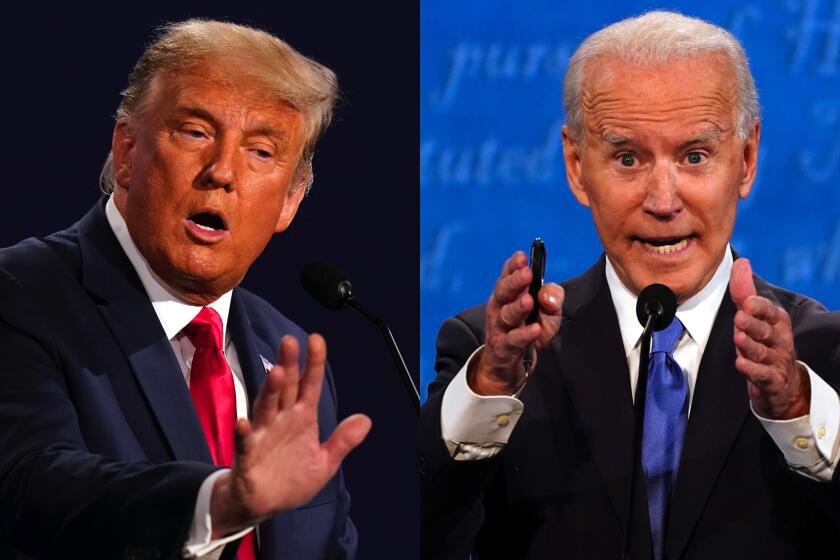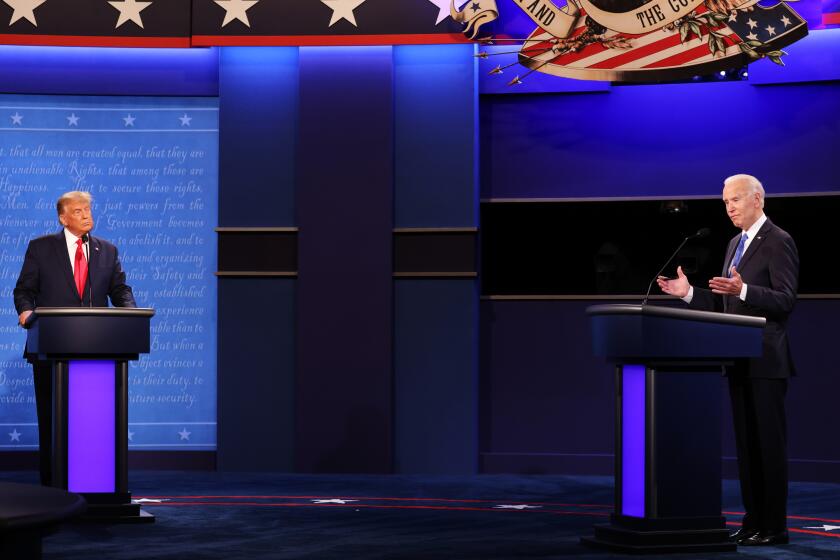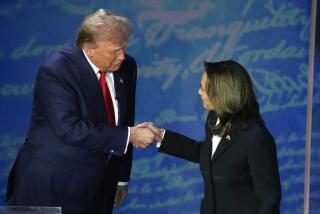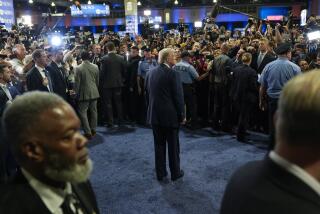Editorial: Break out the hook. This time Trump-Biden debates need tight rules of civility
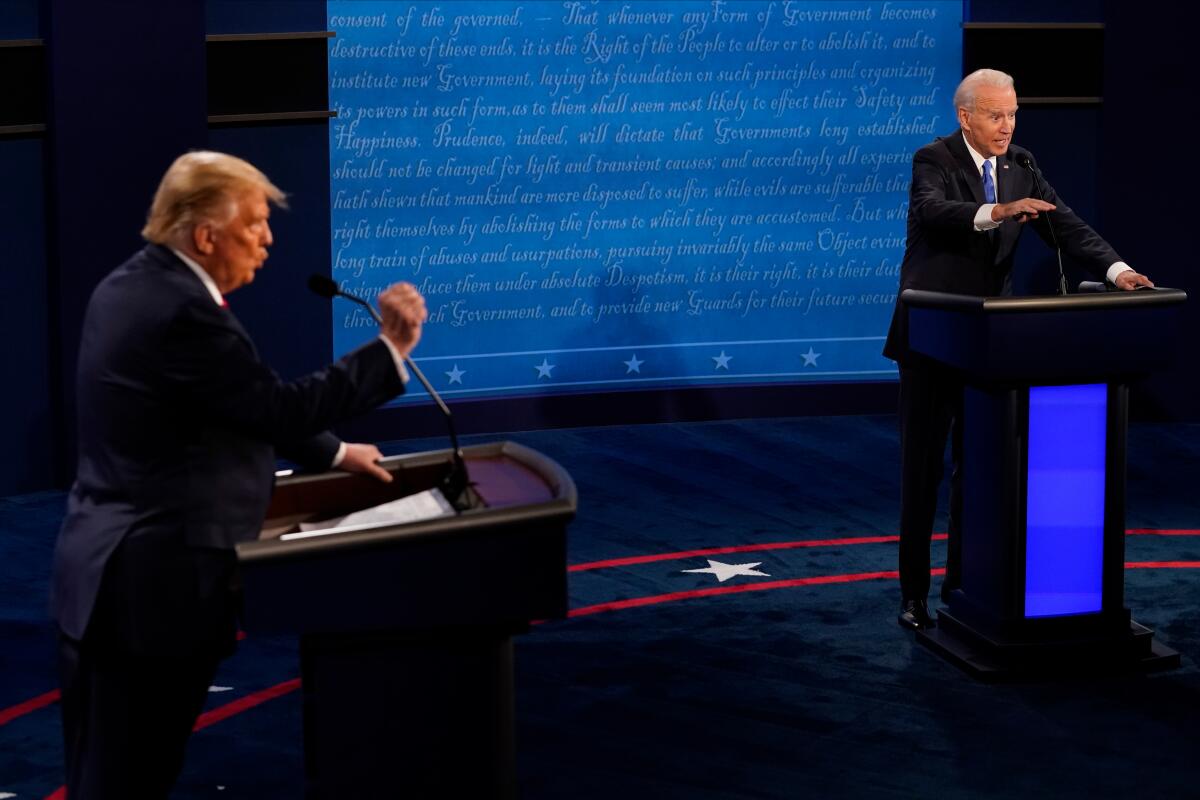
- Share via
President Biden’s statement that he would be “happy” to debate Donald J. Trump means that voters will have at least one opportunity to see the two major-party candidates answer questions side by side. Aside from satisfying some viewers’ interest in whether the elderly candidates display mental lapses, debates offer an opportunity for voters to compare the candidates’ temperaments and glean differences on issues. This is especially useful for those who don’t follow presidential campaigns closely.
That said, Biden could have declined to debate Trump on the legitimate grounds that his likely opponent is not a normal candidate but an unhinged former president who sought to overturn an election he lost — an outrageous campaign that culminated in the Jan. 6 attack on the U.S. Capitol by his followers. In commenting on Trump’s absence from debates during the Republican primary campaign the editorial board wrote: “No one who has attempted to overturn the will of the voters deserves to be on a debate stage again.”
Why is Ron DeSantis faltering? He’s not. Trump is soaring. He has re-coagulated himself like the bad guy in ‘Terminator 2.’
But now that Trump is the presumptive Republican nominee — an indelible stain on the party that has normalized him — it’s impossible to have a meaningful debate without him. By participating, Biden has the opportunity to delineate his differences with his predecessor on everything from abortion rights to the economy to foreign policy. Trump likewise will be able to interrogate Biden on his record.
The question is whether Trump will sabotage the civic purpose of presidential debates, as he did when he went berserk in his first debate with Biden in 2020, incessantly interrupting his opponent and spewing vitriol.
In Thursday’s second and final presidential debate, President Trump said nothing to persuade those who haven’t made up their minds that he deserves a second term.
Ideally the moderator of any 2024 presidential debate would have the steely fortitude of Juan M. Merchan, the judge presiding over Trump’s criminal trial in New York City. Debate moderators can’t hold candidates in contempt of court, levy fines or have misbehaving candidates physically removed, but they aren’t without the authority to keep participants on track. For instance, they can deal decisively with nominees who bluster, bully, ignore time limits and engage in name-calling by shutting off their microphones.
Trump also should not be permitted to meander endlessly into irrelevancies (nor should Biden) or be allowed to roam around the stage to loom over his rival, as he did during a 2016 presidential debate with Hillary Clinton. Keeping the candidates on topic will be easier if the debates are divided into subject areas. We say “debates” in the plural because multiple encounters at least potentially expand the ground that candidates can cover, as well as assure candidates that they won’t be devastated by one bad night.
Is the era of Republican and Democratic presidential nominees sharing a debate stage coming to an end?
The nonpartisan Commission on Presidential Debates has announced dates for three presidential debates — Sept. 16, Oct. 1 and Oct. 9 — and one between vice presidential nominees on Sept. 25. (The Trump campaign has complained that the commission hasn’t scheduled debates soon enough to accommodate early voters. In California, ballots will be mailed out by Oct. 7 and ballot drop off locations will open on Oct. 8. But the commission on Wednesday said that its timetable was based on factors including “religious and federal holidays, early voting, and the dates on which individual states close their ballots.”) Ideally all three debates will go forward, but Biden should feel free to reconsider if Trump doesn’t follow the debate rules.
In an open letter calling for Trump and Biden to debate, a group of news organizations (not including the Los Angeles Times) wrote: “If there is one thing Americans can agree on during this polarized time, it is that the stakes of this election are exceptionally high. Amidst that backdrop, there is simply no substitute for the candidates debating with each other, and before the American people, their visions for the future of our nation.”
Yet for debates to fulfill that function there must be rules of civility and common decency — and candidates must abide by them.
More to Read
A cure for the common opinion
Get thought-provoking perspectives with our weekly newsletter.
You may occasionally receive promotional content from the Los Angeles Times.

